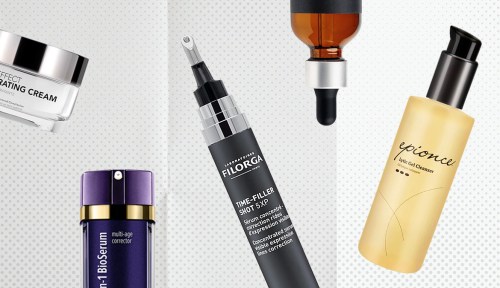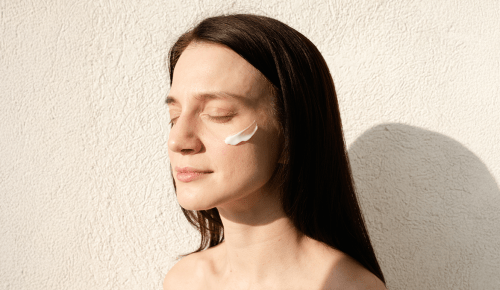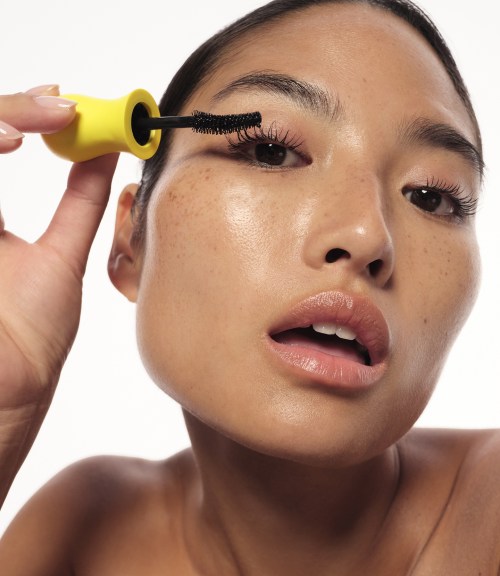Our editors independently select these products. Making a purchase through our links may earn Well+Good a commission
A good skin-care routine is proactive. Including antioxidants like vitamin C and niacinamide is an excellent way to arm your skin against environmental stressors that can lead to issues like hyperpigmentation and premature aging. Both ingredients can make a great addition to your daily regimen, explains Ivy Lee, MD, a board-certified dermatologist based in Pasadena, California.
Experts in This Article
board-certified dermatologist and founder of BTWN, a skin-care line specifically formulated for children, tweens, and teens
board-certified dermatologist and founder of FACET Dermatology
board-certified dermatologist
“Vitamin C and niacinamide decrease the oxidative stress and damage that we get from environmental factors, like UV radiation from being outside, pollution, and smoking,” which all accelerate skin damage, says Dr. Lee. Sunlight creates reactive oxygen species (ROS), which can accumulate over time, causing oxidative stress that degrades collagen and compromises the skin barrier—and niacinamide and vitamin C help stop this process in its tracks. “These ingredients also improve the signs of premature aging, so they can improve fine lines and wrinkles, decrease hyperpigmentation, and increase collagen production.”
Ahead, learn more about niacinamide, vitamin C, their benefits, and expert dermatologist recommendations for buying and using each.
What is niacinamide?
Niacinamide is a form of vitamin B3 that is found naturally in meat, fish, dairy, and green vegetables and can be used topically as a gentle, anti-aging skin antioxidant. It’s most often incorporated into niacinamide serums or mixed in with other skin-care products to provide extra skin support.
“Niacinamide is truly a powerhouse,” says Dr. Geeta Yadav, MD, board-certified dermatologist and founder of FACET Dermatology. “It helps increase cellular turnover, as well as promoting new collagen production. It also helps combat hyperpigmentation and boosts the skin’s production of natural ceramides, as well as reducing inflammation in the skin, which makes it a nice choice for those who suffer from breakouts that tend to turn into post-inflammatory hyperpigmentation.”
Which is better, vitamin C or niacinamide?
While vitamin C and niacinamide both pack similar antioxidant benefits, they also have their differences. “Because it’s a mild acid, vitamin C also gives you more of an exfoliating and brightening effect than niacinamide,” says Dr. Lee. “Niacinamide has a greater impact in terms of hydrating the skin.”
Shopping for quality vitamin C can have a bit of a learning curve, says Dr. Brooke Jeffy, MD, board-certified dermatologist and founder of BTWN, a skin-care line for kids, tweens, and teens. He explains that topical vitamin C can quickly become unstable if packaged in non-opaque bottles and can easily be rendered ineffective. An advantage of niacinamide is that it’s by far the gentler of the two, making it a great vitamin C alternative for those with sensitive skin. However, if you don’t have sensitive skin, Dr. Lee says there’s room for both in your routine, and Dr. Yadav agrees.
“I am a big fan of vitamin C, but the emerging science behind niacinamide is very interesting; I recommend using both ingredients,” says Dr. Yadav. “Vitamin C offers similar but different benefits. In addition to stimulating collagen production, it inhibits elastin breakdown as well as offering enhanced photoprotection when used with sunscreen. It also prevents and combats hyperpigmentation.”
Ahead, get the 411 on the specific benefits—and side effects—associated with each.
Benefits of niacinamide
- Gentle: Unlike vitamin C, niacinamide is not exfoliating and is considered gentle enough for all skin types.
- Smooths skin texture: Niacinamide promotes collagen production and cell turnover, resulting in smoother skin and reduced signs of aging.
- Reduces hyperpigmentation: In clinical studies1, niacinamide has been shown to reduce hyperpigmentation and brighten skin tone.
- Regulate oil production: Niacinamide and oily skin are a match made in heaven; thanks to its anti-inflammatory and calming properties, niacinamide can help regulate stress-induced excessive oil production.
Niacinamide side effects
While mild and considered safe for all skin types, some people may experience adverse reactions to niacinamide. Common side effects of niacinamide include:
- Redness
- Itching
- Burning
Benefits of vitamin C
- Powerful: Vitamin C is considered a powerful chemical exfoliant and may be too strong for sensitive skin.
- Smooths skin texture: Similar to niacinamide, vitamin C boosts collagen production and cell turnover, resulting in smoother skin.
- Brightens skin tone: Vitamin C has been shown to decrease pigmentation and brighten dull skin with repeated use.
Vitamin C side effects
Because of its potency, vitamin C, especially in highly concentrated doses, may be too harsh for sensitive skin types. Some potential side effects of vitamin C include:
- Redness
- Itching
- Burning
- Increased sun sensitivity
- Dryness
How to use niacinamide and vitamin C
If you don’t have sensitive skin, you can add both vitamin C *and* niacinamide to your healthy skin regimen. You can either shop for separate niacinamide and vitamin C serums or hunt for a product that contains both, like the Olay Vitamin C Peptide 24 Moisturizer.
“Oftentimes I will add a vitamin C with niacinamide in the morning routine as a step before their sunscreen, or sometimes I’ll split vitamin C in the morning and then niacinamide in the evening,” says Dr. Lee.
If you have sensitive skin, however, Dr. Lee suggests trying niacinamide first. “For folks who do have that sensitive skin, frequently I’ll start with the niacinamide in their regimen, see how they tolerate that, reassess them about a month, and then if everything’s going well, we’ll add a low-strength vitamin C to see if they tolerate it.”
6 derm-approved niacinamide products
When looking for niacinamide, Dr. Lee says to look for formulas that pair the ingredient with hydrating elements, like hyaluronic acid, so that you can get the most out of its hydrating and barrier repair benefits.
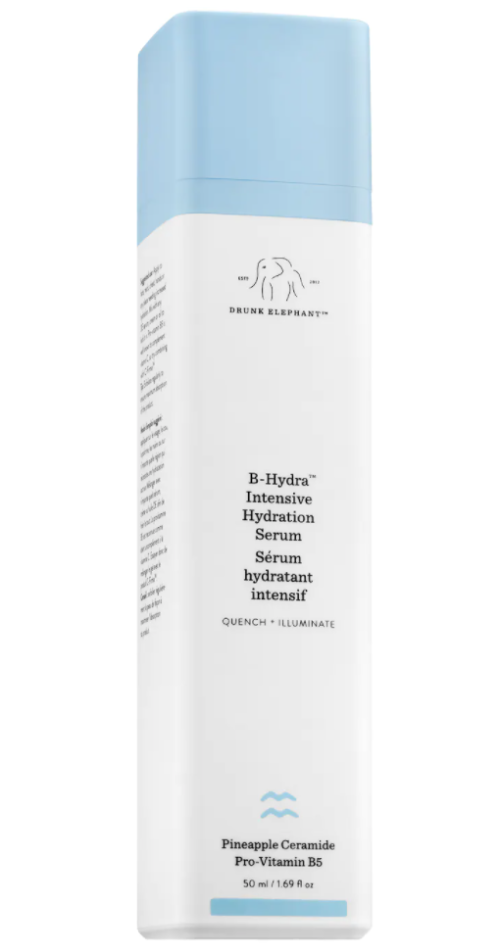
Drunk Elephant, B-Hydra Intensive Hydration Serum — $49.00
Dr. Lee loves formulations that combine niacinamide with other ingredients. This serum combines niacinamide with hyaluronic acid, pineapple ceramides, and vitamin B5 to help seriously up your skin’s hydration alongside its antioxidant defenses.
Pros:
- Improves skin barrier with ceramides
- Ultra-hydrating vitamin B5 complex
Cons:
- A bit pricey
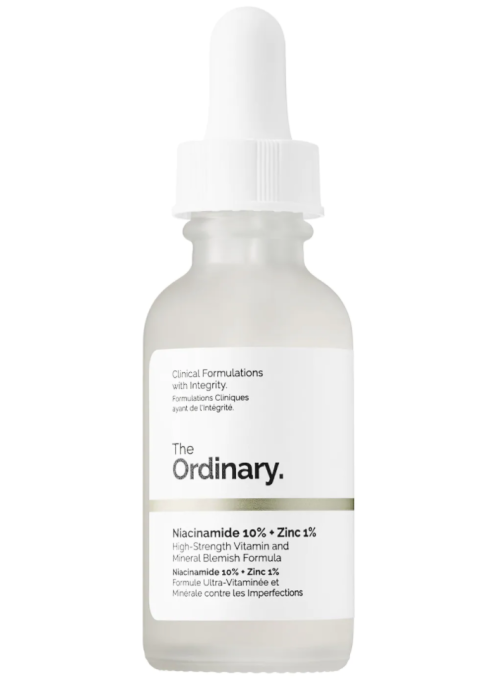
The Ordinary, Niacinamide 10% + Zinc 1% Oil Control Serum — $6.00
“In terms of standalone niacinamide, I do like The Ordinary just because it is such an easy price point for people to try out,” says Dr. Lee. Zinc helps to regulate excess sebum activity while niacinamide helps to brighten and clear the complexion.
Pros:
- Affordable
- High-strength 10% niacinamide
Cons:
- No other ingredients or benefits
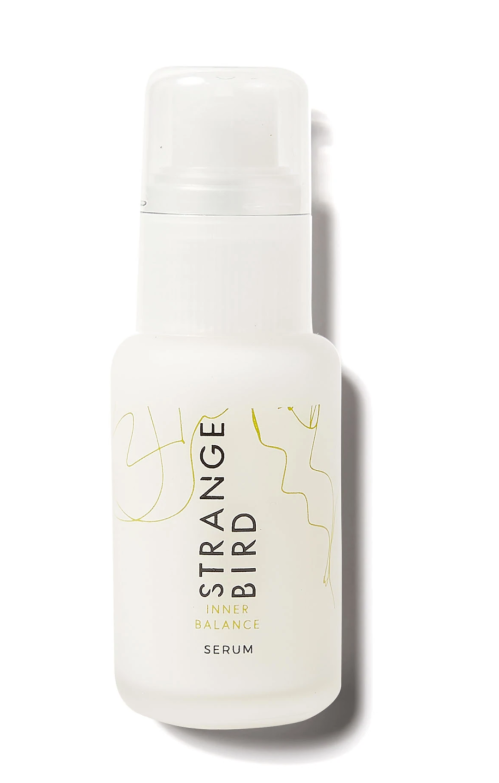
Strange Bird, Inner Balance Serum — $88.00
This serum combines niacinamide, licorice root, and reishi mushrooms to soothe skin while ginger, ginseng, and goji berry help reduce inflammation and hydrate.
Pros:
- Contains skin-boosting ingredients like licorice root, reishi mushrooms, ginger, ginseng, and goji berry
- Hydrating and anti-inflammatory
Cons:
- Premium price point
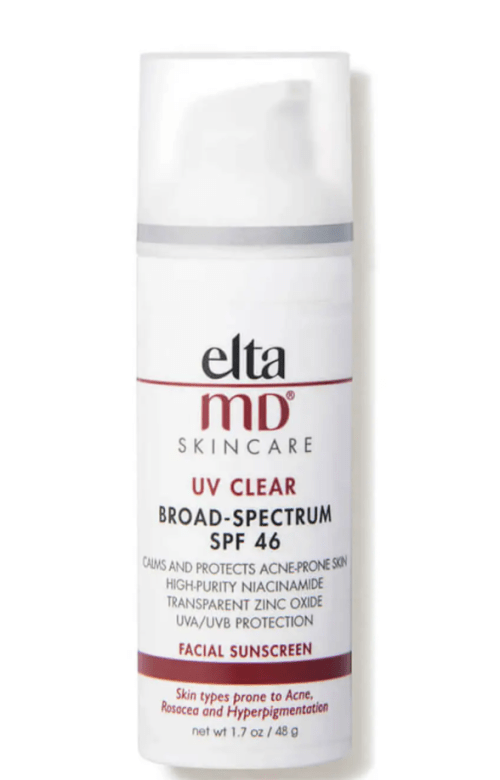
EltaMD, UV Clear Broad-Spectrum SPF 46 — $41.00
“I love combining niacinamide with sunscreen and that’s why I love that Elta line that includes niacinamide and hyaluronic acid,” says Dr. Lee. This zinc-oxide-based mineral sunscreen provides great, sheer sun protection.
Pros:
- Contains SPF 46
- Reduces shine and refines pores
Cons:
- A bit pricey
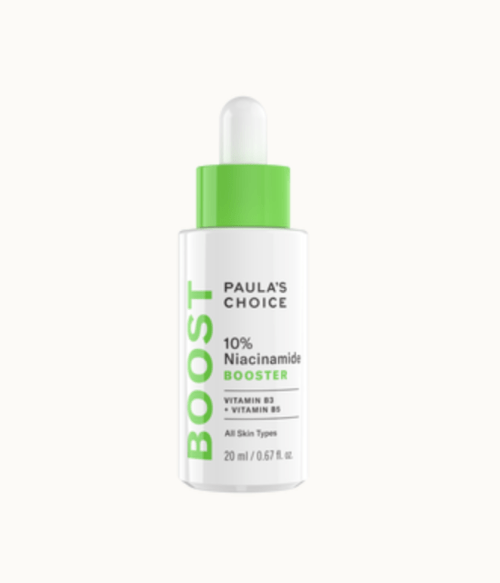
Paula's Choice, 10% Niacinamide Booster — $49.00
This serum from Paula’s Choice contains 10 percent niacinamide and vitamin C to help minimize the appearance of enlarged pores and brighten skin while licorice root and allantoin soothe sensitive skin, and panthenol helps the skin attract and retain moisture.
Pros:
- Targets appearance of large pores
- Contains both niacinamide and vitamin C
Cons:
- A bit pricey
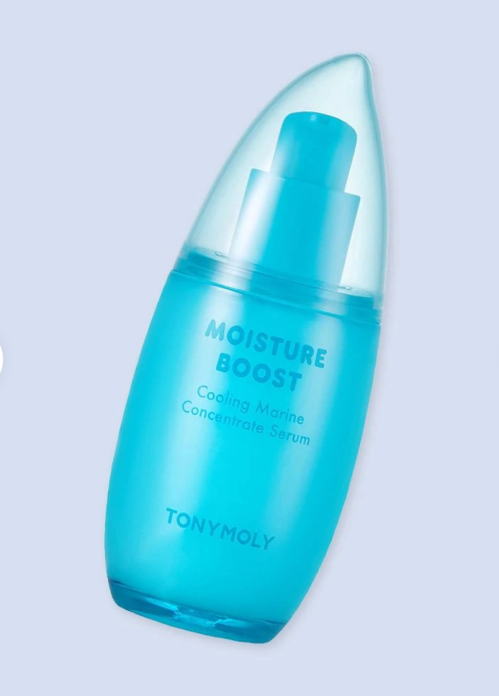
TonyMoly, Moisture Boost Cooling Marine Concentrate Serum — $18.00
Drench your skin in moisture with this marine-concentrate serum from Tony Moly. It’s got three different weights of hyaluronic acid, a blend of four mineral-rich marine ingredients, ice plant extract, and niacinamide to hydrate, strengthen, and brighten your complexion.
Pros:
- Plumps, brightens, and smooths
- 4X Marine Blue Complex deeply hydrates skin
Cons:
- ‘Cooling’ effect might be irritating for sensitive skin
6 derm-approved vitamin C products
When looking for vitamin C, Dr. Lee says to look out for ones that contain 10 to 30 percent L-ascorbic acid as that’s “the most bioactive form of vitamin C.” Plus, make sure it’s in a dark or opaque container that won’t let light in. “Vitamin C is highly unstable as a molecule, and UV light degrades it,” she says. “So if it’s in a see-through bottle, your vitamin C is probably not going to be very active if you leave it on your bathroom counter.”
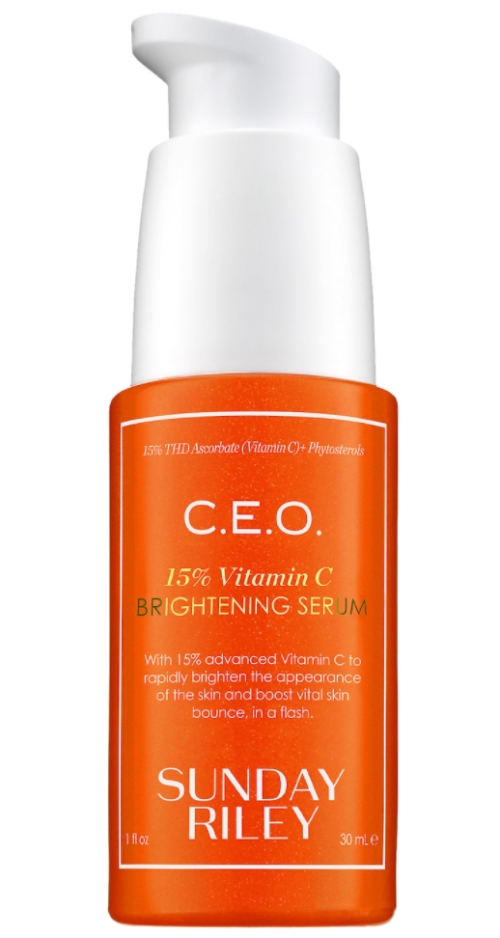
Sunday Riley, C.E.O. 15% Vitamin C Brightening Serum — $85.00
For folks with sensitive skin who may be able to withstand vitamin C, Dr. Lee recommends this serum from Sunday Riley. It contains a gentle concentration of 15 percent vitamin C to help visibly minimize pores, brighten dark spots, and target signs of aging.
Pros:
- Brightens skin and improves texture
- Targets dark circles and spots
Cons:
- Premium price point
- Not for sensitive skin
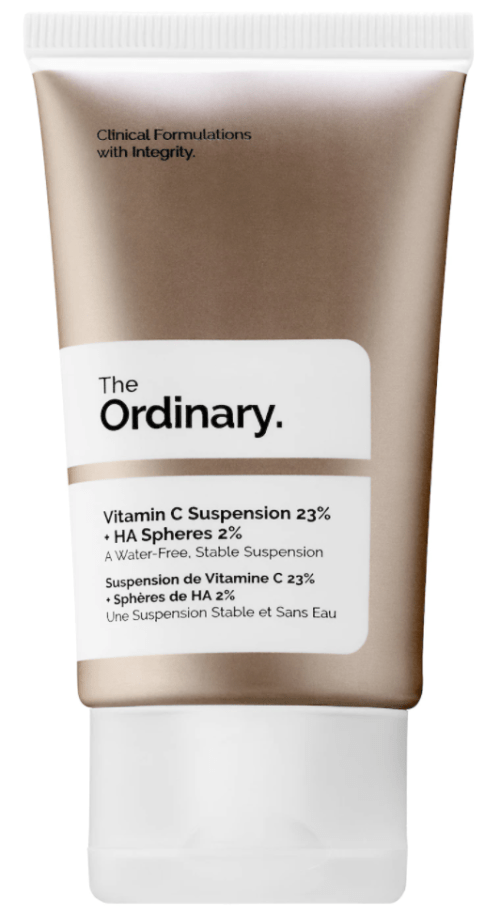
The Ordinary, Vitamin C Suspension 23% + HA Spheres 2% — $8.00
Dr. Lee recommends that those with less sensitive skin start with an option from The Ordinary since it’s so affordable. She recommends this 23 percent vitamin C mixed with hyaluronic acid spheres to anyone who prefers more of a hydrating, liquid serum.
If you prefer more of a matte finish, Dr. Lee says to start with their Vitamin C Suspension 30% in Silicone formula.
Pros:
- Affordable
- Has spheres of hyaluronic acid to aid hydration
Cons:
- No extra benefits or uses
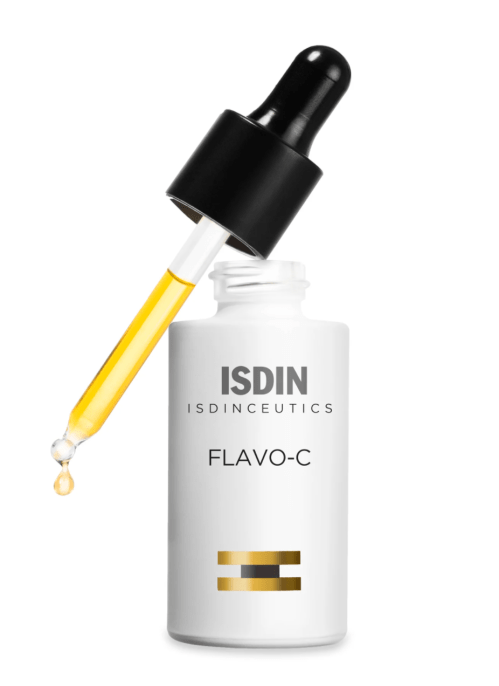
Isdin Isdinceutics, Flavo-C Serum — $110.00
Dr. Lee is also a big fan of this vitamin C serum. It provides great protection against damaging free radicals caused by UVA and UVB rays is “a serum that I would recommend before sunscreen,” she says.
Pros:
- Protects against free radicals
- Smooths fine lines and wrinkles
- Hydrating
Cons:
- Premium price point
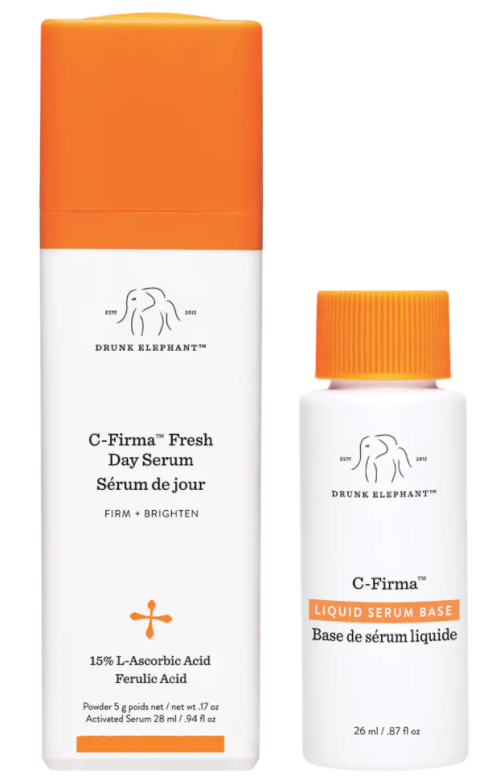
Drunk Elephant, C-Firma Fresh Day Serum — $78.00
Vitamin C has so many benefits, but one of its major drawbacks is that it’s hard to keep fresh for long, explains Dr. Lee. This formulation from Drunk Elephant allows you to mix the formula when you get it, meaning the vitamin C isn’t losing its efficacy while it sits on the shelf.
Pros:
- Targets fine lines and wrinkles
- Protects against free radicals
- Soothes irritation
Cons:
- Premium price point
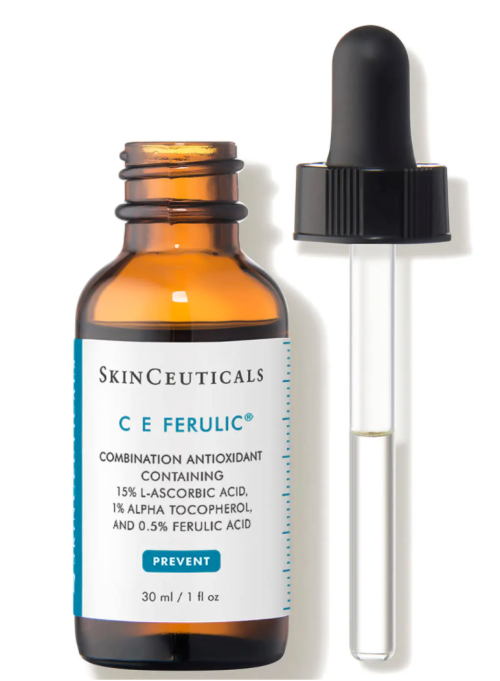
Skinceuticals, C E Ferulic — $182.00
“For those who are not price-sensitive, I really like the Skinceuticals C E Ferulic,” says Dr. Lee. This much-loved serum is considered the holy grail of vitamin C serums. It’s made with vitamin E and ferulic acid to reduce oxidative damage from free radicals generated by UV rays and environmental pollutants, improves the appearance of fine lines and wrinkles, and evens, brightens, and firms the skin.
Pros:
- Ideal for sensitive skin types
- Neutralizes free radicals
- Improves the appearance of fine lines and wrinkles
Cons:
- Premium price point
Vitamin C and niacinamide FAQs:
What does niacinamide do to the face? Is niacinamide good for skin every day?
Yes!
Niacinamide is gentle enough to be used daily, according to Dr. Yadav—as long as your skin can handle the repeated exposure. Niacinamide is an antioxidant that smooths skin texture, brightens dull skin, and locks in moisture.
“You can use niacinamide daily, especially at lower concentrations,” says Dr. Yadav. “Concentrations of 2-10% are shown to provide results with minimal risk of irritation. It’s always better to start with a lower concentration and work your way up to ensure your skin can tolerate it.”
What should you not mix with niacinamide?
While niacinamide is not considered an exfoliant, it’s important to be conscious about other exfoliating products you may already have in your healthy skin regimen. Repeatedly exposing your skin to several chemical and physical exfoliants at once can result in symptoms of over-exfoliation like red, irritated skin, itchiness, dryness, breakouts, and heightened sensitivity.
“AHAs, BHAs, and vitamin C can lead to increased irritation, but if tolerated, they’re okay to use together,” says Dr. Jeffy.
“This could be sensitizing to the skin and leave you at risk for photodamage,” adds Dr. Yadav, who recommends closely monitoring how your skin reacts to doubling up on exfoliants while using niacinamide.
Why can’t you use vitamin C and niacinamide together?
Dermatologists sometimes warn against combining vitamin C and niacinamide because they’re both exfoliating, but according to Dr. Jeffy and Dr. Yadav, they can live in harmony within your skin-care regimen—just in smaller doses and not at the same time.
“This is controversial, but I believe you can [use them both],” says Dr. Yadav. “However, the two of them can be sensitizing separately, so using them together may be especially sensitizing when used by some skin types, so consider that before trying it. You can always use one in the morning—I’d recommend vitamin C because of its photoprotective benefits—and one in the evening.“
Is niacinamide anti-aging?
Yes!
Niacinamide promotes collagen production and new cell turnover, making it a great addition to any anti-aging skin-care regimen. Niacinamide isn’t as strong as other anti-aging ingredients like retinol, but research2 shows that it’s effective at improving some signs of aging skin.
“Niacinamide improves texture, helps with hyperpigmentation, and benefits collagen, so yes, it can be considered anti-aging,” says Dr. Jeffy.
Who should not use niacinamide on their face?
Niacinamide is considered mild enough to be used on all skin types, but as with any skin-care active ingredient, some people may experience adverse reactions like burning, itching, or redness.
“It can cause reactivity in some skin types, so I’d recommend testing niacinamide via a patch test before committing to full-face application, especially using a lower concentration as very high concentrations, like 20%, can cause some irritation,” says Dr. Yadav.
- Hakozaki, T et al. “The effect of niacinamide on reducing cutaneous pigmentation and suppression of melanosome transfer.” The British journal of dermatology vol. 147,1 (2002): 20-31. doi:10.1046/j.1365-2133.2002.04834.x↩︎
- Al-Niaimi, Firas, and Nicole Yi Zhen Chiang. “Topical Vitamin C and the Skin: Mechanisms of Action and Clinical Applications.” The Journal of clinical and aesthetic dermatology vol. 10,7 (2017): 14-17.↩︎
- Bissett, Donald L et al. “Niacinamide: A B vitamin that improves aging facial skin appearance.” Dermatologic surgery : official publication for American Society for Dermatologic Surgery [et al.] vol. 31,7 Pt 2 (2005): 860-5; discussion 865. doi:10.1111/j.1524-4725.2005.31732↩︎
Sign up for the Well+Good SHOP Newsletter
Get exclusive deals on wellness, beauty, fitness, and food products that have been hand-picked by our editors.
Got it, you've been added to our email list.

